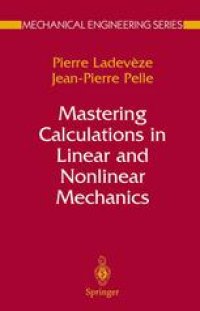
Ebook: Mastering Calculations in Linear and Nonlinear Mechanics
- Tags: Mechanical Engineering, Numerical and Computational Methods in Engineering, Structural Mechanics
- Series: Mechanical Engineering Series
- Year: 2005
- Publisher: Springer-Verlag New York
- Edition: 1
- Language: English
- pdf
Mastering Calculations in Linear and Nonlinear Mechanics is concerned with the management of calculations in linear and nonlinear mechanics. In the last twenty years or so this constant preoccupation in industry as well as in research has gone through a revolution with the advent of truly quantitative tools. Particular attention is given to error estimators and indicators for structural analysis, as this domain is the most mature today. The accent is on the concept of error in constitutive relation. An important part of this work is also devoted to the utilization of the error estimators involved in a calculation, beginning with the parameters related to the mesh.
Many of the topics are taken from the most recent research by the authors: local error estimators, extension of the concept of error in constitutive relation to nonlinear evolution problems and dynamic problems, adaptive improvement of calculations in nonlinear mechanics.
This work is intended for all those interested in mechanics: students, researchers and engineers concerned with the construction of models as well as their simulation for industrial purposes.
Mastering Calculations in Linear and Nonlinear Mechanics is concerned with the management of calculations in linear and nonlinear mechanics. In the last twenty years or so this constant preoccupation in industry as well as in research has gone through a revolution with the advent of truly quantitative tools. Particular attention is given to error estimators and indicators for structural analysis, as this domain is the most mature today. The accent is on the concept of error in constitutive relation. An important part of this work is also devoted to the utilization of the error estimators involved in a calculation, beginning with the parameters related to the mesh.
Many of the topics are taken from the most recent research by the authors: local error estimators, extension of the concept of error in constitutive relation to nonlinear evolution problems and dynamic problems, adaptive improvement of calculations in nonlinear mechanics.
This work is intended for all those interested in mechanics: students, researchers and engineers concerned with the construction of models as well as their simulation for industrial purposes.
Mastering Calculations in Linear and Nonlinear Mechanics is concerned with the management of calculations in linear and nonlinear mechanics. In the last twenty years or so this constant preoccupation in industry as well as in research has gone through a revolution with the advent of truly quantitative tools. Particular attention is given to error estimators and indicators for structural analysis, as this domain is the most mature today. The accent is on the concept of error in constitutive relation. An important part of this work is also devoted to the utilization of the error estimators involved in a calculation, beginning with the parameters related to the mesh.
Many of the topics are taken from the most recent research by the authors: local error estimators, extension of the concept of error in constitutive relation to nonlinear evolution problems and dynamic problems, adaptive improvement of calculations in nonlinear mechanics.
This work is intended for all those interested in mechanics: students, researchers and engineers concerned with the construction of models as well as their simulation for industrial purposes.
Content:
Front Matter....Pages i-xi
Introduction....Pages 1-6
The notion of quality of a finite element solution....Pages 7-27
The constitutive relation error method for linear problems....Pages 29-50
Other methods for linear problems....Pages 51-77
Principles of the comparison of the various estimators in the linear case....Pages 79-90
Mesh adaptation for linear problems....Pages 91-138
The constitutive relation error method for nonlinear evolution problems....Pages 139-205
The constitutive relation error method in dynamics....Pages 207-275
Techniques for constructing admissible fields....Pages 277-348
Estimation of local errors....Pages 349-379
Back Matter....Pages 381-413
Mastering Calculations in Linear and Nonlinear Mechanics is concerned with the management of calculations in linear and nonlinear mechanics. In the last twenty years or so this constant preoccupation in industry as well as in research has gone through a revolution with the advent of truly quantitative tools. Particular attention is given to error estimators and indicators for structural analysis, as this domain is the most mature today. The accent is on the concept of error in constitutive relation. An important part of this work is also devoted to the utilization of the error estimators involved in a calculation, beginning with the parameters related to the mesh.
Many of the topics are taken from the most recent research by the authors: local error estimators, extension of the concept of error in constitutive relation to nonlinear evolution problems and dynamic problems, adaptive improvement of calculations in nonlinear mechanics.
This work is intended for all those interested in mechanics: students, researchers and engineers concerned with the construction of models as well as their simulation for industrial purposes.
Content:
Front Matter....Pages i-xi
Introduction....Pages 1-6
The notion of quality of a finite element solution....Pages 7-27
The constitutive relation error method for linear problems....Pages 29-50
Other methods for linear problems....Pages 51-77
Principles of the comparison of the various estimators in the linear case....Pages 79-90
Mesh adaptation for linear problems....Pages 91-138
The constitutive relation error method for nonlinear evolution problems....Pages 139-205
The constitutive relation error method in dynamics....Pages 207-275
Techniques for constructing admissible fields....Pages 277-348
Estimation of local errors....Pages 349-379
Back Matter....Pages 381-413
....